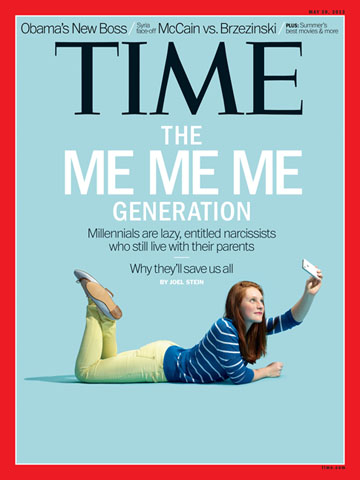
(3 of 8)
Though they're cocky about their place in the world, millennials are also stunted, having prolonged a life stage between teenager and adult that this magazine once called twixters and will now use once again in an attempt to get that term to catch on. The idea of the teenager started in the 1920s; in 1910, only a tiny percentage of kids went to high school, so most people's social interactions were with adults in their family or in the workplace. Now that cell phones allow kids to socialize at every hour--they send and receive an average of 88 texts a day, according to Pew--they're living under the constant influence of their friends. "Peer pressure is anti-intellectual. It is anti-historical. It is anti-eloquence," says Mark Bauerlein, an English professor at Emory, who wrote The Dumbest Generation: How the Digital Age Stupefies Young Americans and Jeopardizes Our Future (Or, Don't Trust Anyone Under 30). "Never before in history have people been able to grow up and reach age 23 so dominated by peers. To develop intellectually you've got to relate to older people, older things: 17-year-olds never grow up if they're just hanging around other 17-year-olds." Of all the objections to Obamacare, not a lot of people argued against parents' need to cover their kids' health insurance until they're 26.
Millennials are interacting all day but almost entirely through a screen. You've seen them at bars, sitting next to one another and texting. They might look calm, but they're deeply anxious about missing out on something better. Seventy percent of them check their phones every hour, and many experience phantom pocket-vibration syndrome. "They're doing a behavior to reduce their anxiety," says Larry Rosen, a psychology professor at California State University at Dominguez Hills and the author of iDisorder. That constant search for a hit of dopamine ("Someone liked my status update!") reduces creativity. From 1966, when the Torrance Tests of Creative Thinking were first administered, through the mid-1980s, creativity scores in children increased. Then they dropped, falling sharply in 1998. Scores on tests of empathy similarly fell sharply, starting in 2000, likely because of both a lack of face-to-face time and higher degrees of narcissism. Not only do millennials lack the kind of empathy that allows them to feel concerned for others, but they also have trouble even intellectually understanding others' points of view.
What they do understand is how to turn themselves into brands, with "friend" and "follower" tallies that serve as sales figures. As with most sales, positivity and confidence work best. "People are inflating themselves like balloons on Facebook," says W. Keith Campbell, a psychology professor at the University of Georgia, who has written three books about generational increases in narcissism (including When You Love a Man Who Loves Himself). When everyone is telling you about their vacations, parties and promotions, you start to embellish your own life to keep up. If you do this well enough on Instagram, YouTube and Twitter, you can become a microcelebrity.
